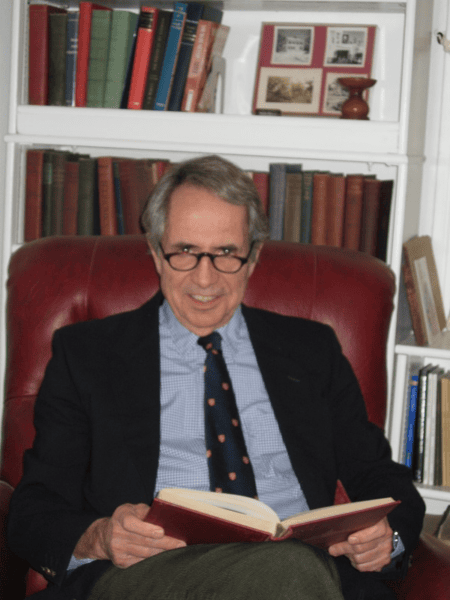
Richard W. Davis. Courtesy Susannah Levi
Richard W. Davis passed away on December 25, 2015, after a prolonged illness. He was 80. A specialist in British history, he spent most of his career at Washington University in St. Louis, where he served as chair of the Department of History (1974–77) and director of the Center for the History of Freedom (1989–2003). Author or editor of 11 books, Davis was a fellow of the Royal Historical Society and a distinguished visiting professor (1981–82) at Christ’s College, Cambridge.
Davis was born on December 8, 1935, in Somers, Connecticut, which he would call a “small rural New England town” in a volume coauthored with his father, Fred C. Davis. Richard attended Amherst College, graduating magna cum laude in 1957. His education soon took him further afield. At Columbia University, he trained under Robert K. Webb and John H. Plumb. Davis’s performance in his Columbia qualifying exam so impressed Plumb that the English historian arranged for him to study at Christ’s College. After earning a Cambridge MLitt in 1962, Davis graduated with his Columbia PhD in 1963, filing the dissertation that became Dissent in Politics, 1780–1830: The Political Life of William Smith, MP (1971).
In this biography of William Smith, the religious dissenter and political reformer, Davis explored themes that would define his career: the patterns of politics and political behavior; the role of ideas, especially religion, in politics; and the influence of individuals upon large-scale historical transformations. His next book, Political Change and Continuity, 1760–1885: A Buckinghamshire Study (1972), followed the rise of “middle-class politics” at the scale of the county and borough. Rejecting monolithic concepts of class and stale distinctions between town and country, Davis found in rural Buckinghamshire the ascent of “a new kind of politics,” indicating a “profound” change in British political life. His third book sought a broader audience. Disraeli (1976) presented a political life of a prime minister whom Davis characterized as charming, effective, and empathetic, but also self-serving and narcissistic. More sympathetic to William Gladstone, Disraeli’s principled rival, Davis discerned in Disraeli a politician whose example reverberated in his own era, in what he called a more “skeptical and less serious age.”
After completing this trilogy of books on 19th-century British politics, Davis turned in the 1980s to new topics. His only foray into cultural history yielded an article-length study of Anglo-American marriages, a topic that echoed his own family life. More significant was The English Rothschilds (1983), a landmark history of the English branch of the great European banking family. Spanning four generations of Rothschilds, Davis’s analysis focused on the complex nexus between economic power and political power. The book was also a significant excursion into the Anglo-Jewish experience, which Davis characterized in terms of relative toleration but enduring political and social exclusion.
Davis turned next to political institutions. His Political History of the House of Lords, 1811–1846 (2008) dispelled decades of neglect and affirmed the centrality of the House of Lords during the heroic phase of British political reform. Davis’s last, unfinished project was a biographical study of the Grenvilles, the Whig family that exercised profound influence upon British politics in the early 19th century.
Taken as a whole, Davis’s scholarship traced and clarified the complex political processes that transformed Great Britain from a cloistered and aristocratic realm into a relatively tolerant, liberal, and democratic society. As colleagues, friends, and family will attest, tolerance, liberalism, and democracy were not only phenomena whose origins Davis’s work aspired to explain but also values that Davis himself personified.
Beyond his major monographs, Richard Davis edited or coedited five volumes of essays, including The Origins of Modern Freedom in the West, a contribution to the Making of Modern Freedom series that Davis supervised at the Center for the History of Freedom at Washington University. Spanning 15 volumes, this series offers collaborative and panoramic vantage on what he called the “modern, conceptually distinct, idea of freedom” that “disentangles itself first in England in the early seventeenth century and then, with many confusions, denials, reversals, and cross-purposes, elsewhere in Europe and the world.” As the general editor of the series, Davis assembled an array of sparkling talent, hosted a parade of conferences, and ushered successive volumes through publication at Stanford University Press. His adept execution of this formidable administrative task showcased the diplomatic acumen that made him, in the assessment of his friend and colleague Jack Hexter, “a first-rate academic politician.”
Davis was a dedicated, gifted teacher who took great pride in the accomplishments of his students, graduate and undergraduate alike. He began his teaching career at the University of Rhode Island and moved in 1964 to the University of California, Riverside. Davis left California in 1969 for Washington University, where he taught until his retirement in 2003. The school and its students hailed him for his effectiveness in the classroom, recognizing him in 1971 as a “favorite faculty member.” No less telling is the remarkable success of his graduate students, over 20 in number.
Davis is mourned by the family he cherished: Elisabeth, his wife of 50 years; his sons, Benjamin and Matthew, and their wives; his grandchildren, Henry and Eva; and the extended Davis, Sargent, and Coles families. Friends, colleagues, and family will remember Richard Davis not only as a distinguished scholar but also as a man whose abundant empathy, selfless generosity, and penetrating wit tempered his vast integrity and resolute will. We mourn and lament his passing as we celebrate his life.
Daniel J. Sargent
University of California, Berkeley
This work is licensed under a Creative Commons Attribution-NonCommercial-NoDerivatives 4.0 International License. Attribution must provide author name, article title, Perspectives on History, date of publication, and a link to this page. This license applies only to the article, not to text or images used here by permission.